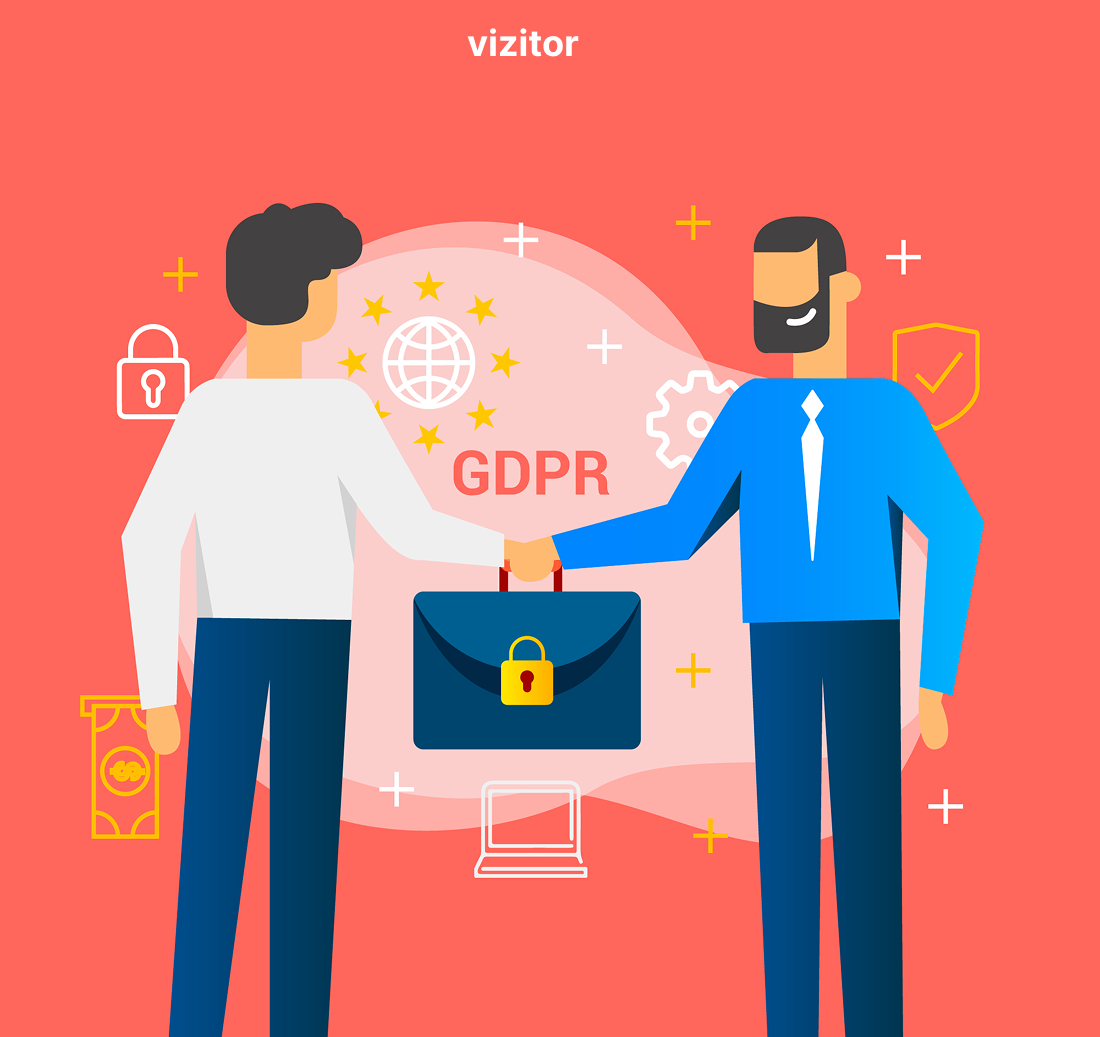Table of Content
Try Vizitor for Free!

Wed, Feb 19, 2025
Read in 7 minutes
Is your Workplace really Secure and Safe for Employees and Customers?
- Do you know that a small data breach can cost a company millions?
- Is your employees’ and customers’ data truly secure?
- If a compliance audit happens today, does your business meet GDPR standards?
If your answer to any of these questions is “no” or “maybe,” then this article is for you. Ensuring security and compliance in today’s digital workplaces is not just a necessity but it’s now a critical requirement for staying competitive among businesses.
GDPR (General Data Protection Regulation) is not just a legal obligation but an essential security practice every business should follow.
Let’s explore GDPR compliance and understand its critical role in workplace security and compliance.
What is GDPR?
Understanding GDPR and Its Purpose
GDPR (General Data Protection Regulation) is a European Union regulation that came into effect on May 25, 2018. Its primary goal is to protect individuals’ personal data and ensure businesses are accountable for handling sensitive information.
If your business collects, stores, or processes data of any European citizen, GDPR applies to you—regardless of where your company operates.
Visitor management systems like Vizitor play a crucial role in ensuring GDPR compliance by securely handling visitor data. Under GDPR, businesses must protect personal information, ensure transparency, and give visitors control over their data.
Common Key Principles of GDPR Compliance:
Lawfulness, Fairness, Transparency: Data collection and usage should be clear and legal.
Purpose Limitation: Data should only be collected for specific and legitimate reasons.
Data Minimization: Collect only the necessary data.
Accuracy: Ensure stored data is correct and up-to-date.
Storage Limitation: Do not store data longer than required.
Integrity & Confidentiality: Data must be protected from unauthorized access.
Accountability: Companies must provide proof of compliance.
Why is GDPR Compliance Critical for Workplace Security?
Workplace security extends beyond physical access controls—it includes protecting sensitive personal and business data from breaches, leaks, and unauthorized use.
With cyber threats increasing globally, GDPR (General Data Protection Regulation) compliance plays a crucial role in ensuring a secure, trustworthy, and legally compliant workplace.
1. Protection of Employee and Customer Data
Businesses store large volumes of sensitive data, including:
- Employee data: Names, salaries, medical records, bank details
- Customer data: Contact information, payment details, preferences
- Business data: Internal communication, intellectual property, financial records
Without strict security measures, this data is vulnerable to breaches, unauthorized access, and misuse. GDPR mandates businesses to implement encryption, access controls, and privacy measures to safeguard personal data.
Let’s take an example: A UK-based law firm suffered a data breach due to weak password policies, exposing client case details. A GDPR-compliant firm, however, would have multi-factor authentication and encryption in place to prevent such incidents.
Also explore: Common Compliance Standards businesses should know about
2. Preventing Costly Data Breaches and Legal Penalties
Non-compliance with GDPR can lead to severe financial penalties and legal consequences. The regulation allows authorities to impose fines of up to €20 million or 4% of a company’s annual turnover (whichever is higher).
Let’s take a closer look at Real-World GDPR Fines:
- Google was fined €50 million for failing to provide clear data processing policies.
- British Airways faced a €183 million penalty for a cyberattack that leaked 500,000 customer records.
- Marriott Hotels paid €20 million after hackers accessed 339 million guest records.
Apart from financial losses, businesses also suffer reputational damage, leading to loss of customer trust and lower revenue.
3. Enhancing Workplace Trust and Reputation
A workplace that values data privacy fosters trust among employees, customers, and partners. GDPR compliance ensures:
- Transparency in data handling policies
- Employees feel secure knowing their personal data is protected
- Customers trust businesses with their sensitive information
Let’s take an example: A GDPR-compliant HR department ensures employee records are securely stored and only accessible to authorized personnel, preventing misuse or leaks.
4. Strengthening Cybersecurity Measures
GDPR enforces strict cybersecurity standards, requiring businesses to:
- Implement data encryption to prevent unauthorized access
- Use multi-factor authentication for system logins
- Conduct regular security audits to identify vulnerabilities
- Develop a data breach response plan
Case Study: A European financial firm prevented a major data leak by encrypting all employee records and limiting access through biometric authentication. When hackers attempted to breach their systems, they could not access or decrypt any personal data.
5. Mandatory Data Breach Notification and Response Plans
Under GDPR, businesses must:
- Report data breaches within 72 hours to authorities and affected users
- Maintain an incident response plan to minimize damage
- Ensure accountability by appointing a Data Protection Officer (DPO)
Let’s take an Example: In 2020, a healthcare company suffered a cyberattack but failed to report it on time. This led to hefty fines and loss of public trust. Had they followed GDPR’s breach notification guidelines, they could have minimized the damage.
6. Reducing Insider Threats and Unauthorized Access
Not all security risks come from external hackers—insider threats (employees mishandling data or unauthorized access) account for nearly 34% of data breaches worldwide.
GDPR compliance helps mitigate this by:
- Implementing role-based access controls (RBAC)
- Conducting employee training on data privacy best practices
- Enforcing strict authentication and monitoring to track data access
Example: A GDPR-compliant company ensures that only HR managers have access to payroll data, preventing unauthorized use by other employees.
7. Future-Proofing Against Evolving Data Protection Laws
With GDPR leading the way, many countries have adopted similar data protection laws, such as:
- CCPA (California Consumer Privacy Act) – USA
- PIPEDA (Personal Information Protection and Electronic Documents Act) – Canada
- India’s Digital Personal Data Protection Act (DPDPA) – 2023
By ensuring GDPR compliance now, businesses can easily adapt to future regulations and remain ahead in global data security trends.
Also explore: The Ultimate Guide to Compliance Management
The Cost of Non-Compliance: What Happens If You Ignore GDPR?
Ignoring GDPR regulations can result in:
Financial penalties: Fines up to €20 million or 4% of annual turnover.
Legal consequences: Lawsuits from employees, customers, or regulators.
Reputational damage: Loss of trust, customer churn, and PR crises.
Example: British Airways was fined €183 million for failing to secure customer data, leading to a major cybersecurity breach.
Ensuring GDPR compliance isn’t just about avoiding fines—it’s about building a secure and trustworthy workplace.
Steps to Make GDPR a Workplace Culture, Not Just a Compliance Checklist
GDPR isn’t just a regulation—it should be part of your company’s security culture. Here’s how:
- Leadership Commitment: Senior management must prioritize data privacy.
- Regular Training: Employees should receive GDPR awareness sessions.
- Privacy-First Approach: Design systems with built-in data protection.
- Incident Response Plan: Have a clear action plan in case of a data breach.
A strong data protection culture not only ensures compliance but also strengthens customer and employee trust.
Ensuring Workplace Data Securityusing Vizitor’s Visitor Management System
Vizitor, as a smart visitor management system, ensures GDPR compliance by safeguarding visitor, employee, and workplace data. It helps businesses:
- Securely store visitor records with encryption
- Control data access through role-based permissions
- Automate data deletion to comply with GDPR’s storage limitation
- Obtain visitor consent before collecting personal details
By using Vizitor, workplaces can seamlessly enhance security while adhering to global data protection standards
The Future of GDPR and Workplace Security
- AI and Data Privacy
As AI-driven data collection increases, GDPR enforcement will become stricter to protect user privacy.
- Rising Cybersecurity Investments
Businesses will invest more in security tools like firewalls, intrusion detection systems, and regular security audits.
- Global Expansion of Data Protection Laws
More countries are expected to introduce GDPR-like regulations, making data security a global priority
How Employee Awareness Impacts GDPR Compliance
Did you know that human error accounts for nearly 85% of data breaches? Even the best security policies fail if employees mishandle data. A strong GDPR training program can:
- Educate employees on phishing attacks and secure password practices
- Encourage responsible data handling and privacy awareness
- Reduce accidental data leaks and insider threats
Conclusion: GDPR is the Backbone of Workplace Security
GDPR compliance isn’t just a legal requirement—it’s a crucial step toward securing employee and customer data, protecting businesses from cyber threats, and fostering workplace trust. By adopting GDPR best practices, companies:
✔ Minimize legal risks and financial penalties
✔ Strengthen cybersecurity defenses
✔ Build long-term trust and brand reputation
Is your workplace fully GDPR compliant? If not, it’s time to implement the necessary measures to ensure data privacy and security.
Learn more about Vizitor!
Contact us today!









